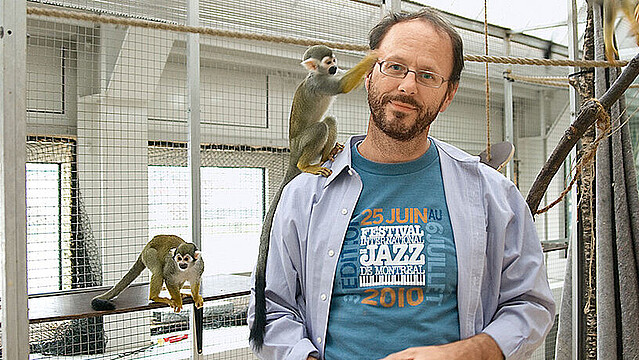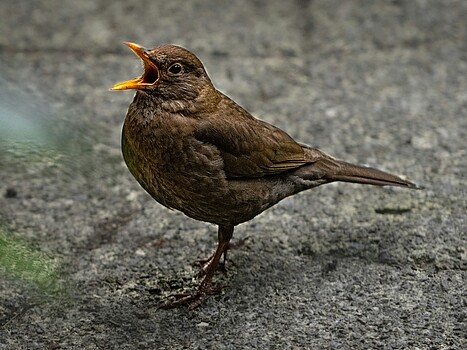Let's meet Tecumseh Fitch, cognitive biologist
November 11, 2025|TA
Since moving to Vienna to create a new Cognitive Biology department at the Universtiy of Vienna, US researcher Tecumseh Fitch has never looked back.
Watch: Tecumseh Fitch tells the story of how he came to research and live in Vienna.
Video by Vienna Business Agency, Melchers Media
When you listen to your favourite artist's new album, feel the hairs on your arms stand as you experience a live concert, or hum a frustratingly catchy melody, do you ever stop and think about how this was made possible?
Speech, language, and music are central aspects of human communication, and yet we take them for granted every single day. How these functions evolved is a question which intrigues Tecumseh Fitch and his research group. They research how the mind evolved and how it works from a neural perspective, and what differences and similarities exist between human and animal minds. They study animal communication and music (think: birdsong and whalesong) and compare it with human communication and music (think: Mozart, Falco, and Udo Jürgens).
Although his lab mainly focuses on basic research, the answers he hopes to find have important implications for many real-world issues. For example, can music therapy help stroke patients regain language? And if so, why? How do we help people with dyslexia learn to read? How can we evaluate the emotional and mental well-being of animals? These are just some of the fascinating challenges Tecumseh's research could help overcome.
A plethora of researchers and plentiful funding
Tecumseh moved to the city 15 years ago when the University of Vienna decided to create a new department - Cognitive Biology - around his research. When he got here, he found a humming scientific and research community with top-notch researchers, a large, motivated student body, and excellent research funding at a city, national, and European level. On top of that, the exceptional quality of life in Vienna has attracted a top-notch research community across a broad spectrum of disciplines. This community, collaborative at its heart, makes getting insights from many other fields of research a breeze - from physics and computer science to biology or neuroscience, Tecumseh sees this way of working as the future of science in the 21st century.
His research group got off to a great start thanks to initial support from the University of Vienna and a European ERC Advanced Grant; consistent funding has allowed them to grow and prosper. Like much of the scientific community in Vienna, Tecumseh and his colleagues are training AI models on specifics types of data, such as bird songs or videos of animal behaviour, to increase efficiency and free up time for the students to focus on research rather than coding. In Tecumseh's opinion, AI is going to revolutionize science in ways we can only begin to imagine today, but we must not overlook its limitations.
"Vienna is a great place to do research and a great place to live. The combination of the University and many smaller organizations is very attractive to excellent outsiders at all levels. The combination is hard to beat"
A city for life
Despite the extensive public transport opportunities, Tecumseh's chosen mode is his trusty bicycle. Whether it's just to work or all the way to Italy, Tecumseh likes to live life in the bike lane - and there are plenty of those in Vienna! For him, it doesn't get much better than biking home from work through the great, green Prater, stopping for a swim in the Danube and listening to the tranquil birdsong on the Donauinsel.
All that cycling certainly works up an appetite, and luckily there's no shortage of choice when it comes to hearty and haute cuisine in Vienna. A flourishing culinary scene sets the stage for an evening of music and dance in any one of the city's numerous hallowed cultural institutions - and plenty of hidden gems, too!
"So many of my PhD students and post-docs have come from other countries and don't want to leave! Vienna is a place people want to come to, and don't want to leave!"
About Tecumseh Fitch
Tecumseh Fitch received his PhD in Cognitive and Linguistic Sciences from Brown University, USA. He worked as lecturer at the Dept. of Biology/Dept. of Psychology at Harvard University, USA, then at the European Institute for Advanced Study, Berlin, Germany. He was a visiting professor at the University of Leipzig, Germany, and a reader at the School of Psychology, University of St Andrews, UK. He joined the Faculty of Life Sciences at the University of Vienna as a full Professor in June 2009, where he co-founded the Department of Cognitive Biology. His biolinguistics research was funded by a five year ERC Advanced Grant to study the perceptual and cognitive mechanisms underlying syntax in humans, nonhuman primates, birds and reptiles. He was elected a Member of the US National Academy of Sciences in 2025.

